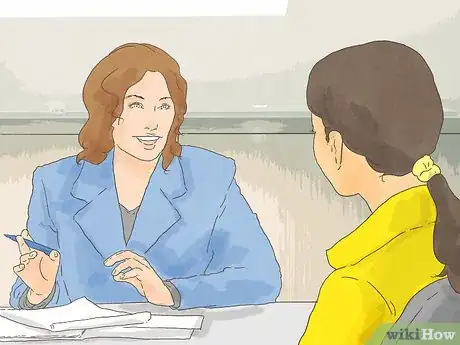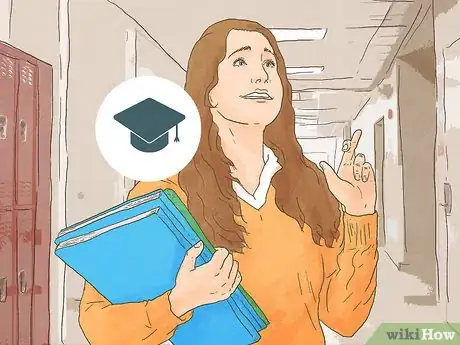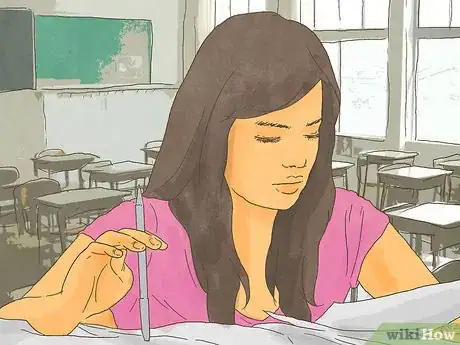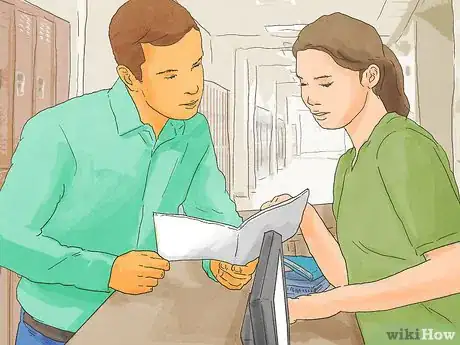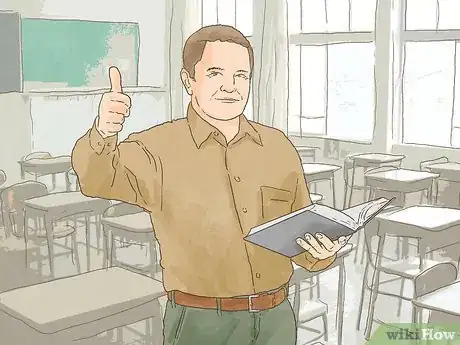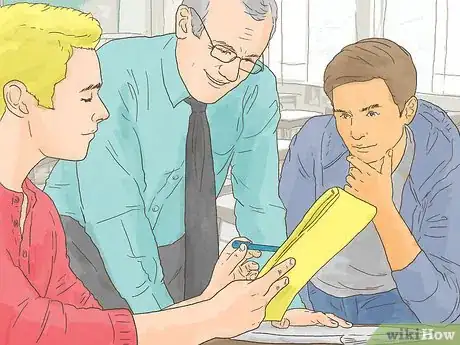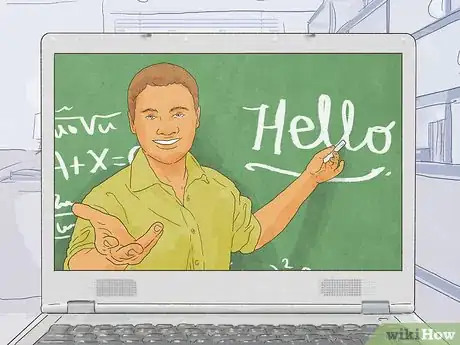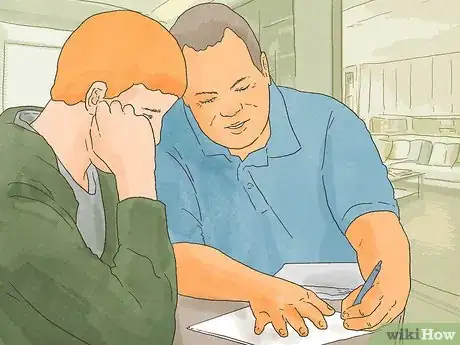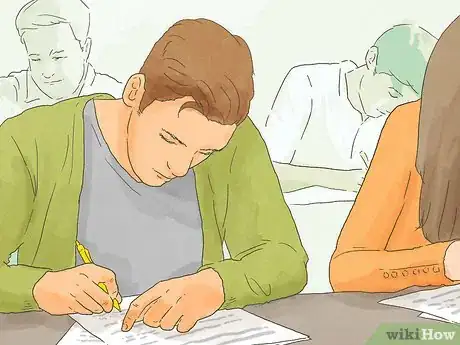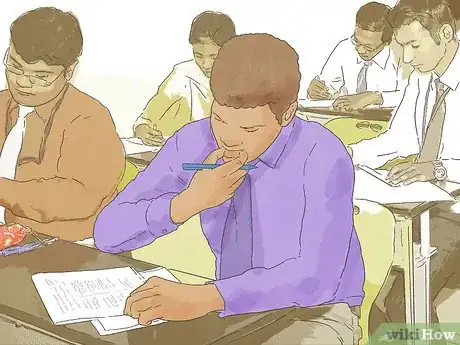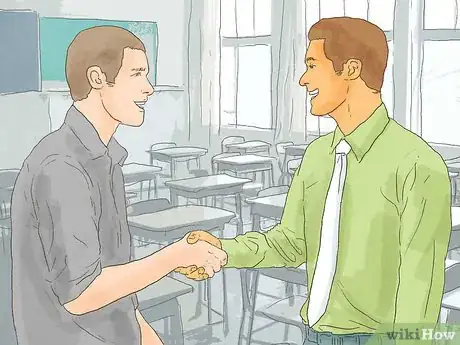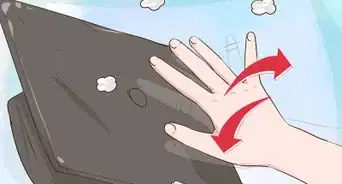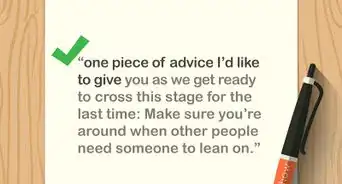This article was co-authored by Ashley Pritchard, MA and by wikiHow staff writer, Sophia Latorre. Ashley Pritchard is an Academic and School Counselor at Delaware Valley Regional High School in Frenchtown, New Jersey. Ashley has over 3 years of high school, college, and career counseling experience. She has an MA in School Counseling with a specialization in Mental Health from Caldwell University and is certified as an Independent Education Consultant through the University of California, Irvine.
There are 13 references cited in this article, which can be found at the bottom of the page.
wikiHow marks an article as reader-approved once it receives enough positive feedback. In this case, 85% of readers who voted found the article helpful, earning it our reader-approved status.
This article has been viewed 725,215 times.
Graduating from high school early can be both an exciting and challenging process. There are many options available to high school students hoping to graduate ahead of time. With a little research and careful planning, you can choose the best program to help you graduate early and reach your next set of goals!
Steps
Creating a Plan
-
1Talk to your guidance counselor or principal.[1] Graduating early is a big, important decision. Be sure to talk with your guidance counselor or principal to make sure graduating early is right for you.[2]
- If you don't see or meet with your guidance counselor or principal on a regular basis, request an appointment with one of them at the main office.
- To begin the conversation, explain why you'd like to graduate early and what your plans are once you do. Next, ask for their thoughts and ideas.
-
2Determine what classes you still need. If your guidance counselor or principal is agreeable to you graduating early, ask about what classes you still need to take in order to graduate. You can also ask for advice on how to get those classes finished within your designated time frame.[3]
- Many students who have taken advanced courses throughout middle school are able to graduate after two years of high school. Students who take advanced courses for three years of high school can often skip their last year.
Advertisement -
3Find out if you need a certain number of credits. Your eligibility to graduate early will depend on your school and local district rules.[4] For example, some schools require a certain number of credits for graduation. Ask your guidance counselor if this is true for your district, and if so, find out how many credits you will need to graduate.
-
4Determine if you’ll need to pass an exam to graduate. Some schools may require you to pass a graduation test. Additionally, you may not be eligible to take the exam until you've had at least two years of high school. Ask your guidance counselor if your school or district requires that you take an exam, and find out what the prerequisites for taking the exam are.[5]
-
5Check with your parents. Before you make a definite decision about graduating early, be sure to talk with your parents or guardians. In order to graduate early, you might need to attend online courses, start a homeschooling program, or enroll at a community college.[6]
- These options can be difficult for some families to accommodate, so be sure to ask your parents or guardians for their help with planning.
- You may also need a signature from a parent or guardian showing consent for early graduation from your high school or for enrollment into accelerated graduation programs.
-
6Get a few copies of your transcripts. To qualify for accelerated graduation programs outside of your high school, you will likely be asked by admissions teams to provide student records for their review. You will also need to send transcript copies with college applications. Make sure you ask your high school to provide you with 3 or 4 copies of your transcripts.[7]
-
7Ask your teachers for letters of recommendation. To gain acceptance into accelerated graduation programs (and also college), many admissions teams require letters of recommendation from your teachers, mentors, or coaches. Be sure to ask for these before you leave your current high school.[8]
- You’ll want to ask teachers, mentors, and coaches who know you well and will be able to vouch for your personal character, as well as your aptitude and performance level.
- Try to get 3 or 4 letters of recommendation and make sure those who give them to you are not related to you or each other.
-
8Analyze your work and extracurricular activity schedule. Graduating early will likely require a major increase in your study and homework load. This means that you may not have as much time for work or extracurricular activities as you did in regular high school. Be sure that less work and play fits into your financial, recreation, and social goals.[9]
- If you plan to get into college with a scholarship for sports or a high school club activity (like science club), be sure that you’ll still be eligible with early graduation and have time to qualify or participate with an increased study and homework schedule.
Fulfilling the Necessary Requirements
-
1Visit local community colleges. Community colleges are local and provide a great stepping stone between high school and university. Many community colleges offer early graduation programs in addition to college courses that will count as both high school and college credit.[10]
- Although earning college credit may not be something that helps you graduate high school early, it will allow you to graduate college early or make it easier to graduate as a double major.
- Proving your aptitude at a community college while still in high school may increase your chances of getting accepted to a higher ranked university.
- If commuting to a community college is difficult for you or your family, many community colleges offer online classes.
-
2Sign up for summer courses at your high school. Summer is a great time to take extra classes if your high school offers summer school programs. By enrolling in summer school for two or three summers in a row, you are likely to accumulate enough credits to graduate high school up to a year ahead of schedule.
-
3Look into community elective courses. Some communities offer public classes on nights, weekends, and during the summer that might fulfill your high school electives needed for graduation. Be sure to check that your high school will recognize these classes for graduation before you sign up.
- Enquire at your local library, community center, or town hall to find out if there are community classes available.
-
4Enroll in online high school. Attending traditional high school takes up a lot of time that isn’t necessarily used for actual class time. For example, it takes time to switch classes, eat lunch, attend school assemblies, and work around so many other students. Attending an online high school may allow you to get more coursework done in the same amount of time you spend at regular school.[11]
- You can find online high schools through an internet search. There are some online schools that allow you to attend right from your personal computer and others require you to show up at an actual building where internet access is provided.[12]
-
5Research homeschooling programs so you can work at your own pace. If you learn better in a secluded setting, homeschooling is another option that might help you graduate early. You can do homeschooling all through high school, or switch to homeschooling to speed up your graduation.[13]
- The advantage of homeschooling is that you can learn at your own pace using your own personal learning style.
- However, you do need a parent, guardian, or supervisor to help manage your work and do the grading.
- Homeschooling can be expensive because you have to buy all the learning materials and pay for testing at independent centers to receive accredited graduation certificates.
- If your parents don’t have time to help homeschool you, search online for local homeschooling groups that may allow you to join them.
-
6Take your GED. The GED is the equivalent of your high school diploma. All you need to do to obtain it is pass the test, which does require a fair bit of studying. GED study classes (both online and in person) are widely available, but they should not be taken in lieu of actual high school classes (if possible) because you could miss out on important college prep.
Finalizing Early Graduation Plans
-
1Make sure your high school credits translate into a high school diploma. Before you enroll in an early graduation program, be sure that the courses you are taking will result in an accredited high school diploma. If you’re unsure, simply ask the program’s enrollment staff. Without an accredited high school diploma, you won’t be considered a high school graduate.
-
2Don’t miss out on college entrance exams. Many high schools offer college entrance exams like the SATs and the ACTs at specific times throughout the school year. They also offer important prep courses for the test. If you plan to attend university, you will need to take these tests regardless of your early graduation status.[16]
- Make sure you stay up to date on when these tests are offered.
- Graduating early does not necessarily improve your chances of getting into college so don’t skip the college entrance exams.
-
3Make financial arrangements. Graduating early can be expensive if you enroll in early graduation programs that are independent of your high school. Not only do the programs cost money, but learning materials (like textbooks) and transportation (like a school bus) are not usually included.
- Make a list of expenses.
- Talk to your parents to see if they can help you with finances.
- Search online for local scholarships you might be able to apply for.
- Check your eligibility for student loans.
-
4Inquire with prospective colleges. Some colleges have extra application guidelines they require prospective students to meet in order to be considered for admission. Check with the colleges you are interested in to be sure that you meet all of their early graduate criteria.[17]
Expert Q&A
-
QuestionCan you graduate high school in 3 years?
 Ashley Pritchard, MAAshley Pritchard is an Academic and School Counselor at Delaware Valley Regional High School in Frenchtown, New Jersey. Ashley has over 3 years of high school, college, and career counseling experience. She has an MA in School Counseling with a specialization in Mental Health from Caldwell University and is certified as an Independent Education Consultant through the University of California, Irvine.
Ashley Pritchard, MAAshley Pritchard is an Academic and School Counselor at Delaware Valley Regional High School in Frenchtown, New Jersey. Ashley has over 3 years of high school, college, and career counseling experience. She has an MA in School Counseling with a specialization in Mental Health from Caldwell University and is certified as an Independent Education Consultant through the University of California, Irvine.
School Counselor Possibly! Each school has its own policies and procedures for graduating early.
Possibly! Each school has its own policies and procedures for graduating early. -
QuestionIs it possible to graduate as a freshman?
 Community AnswerEvery high school has a handbook and in the handbook it tells you what classes you need to graduate. You can not graduate from HS as a freshman, because you are just starting those required classes. You can also look at the handbook in your counselor's office. He or she will go over with you what classes you have to take each of your years at high school.
Community AnswerEvery high school has a handbook and in the handbook it tells you what classes you need to graduate. You can not graduate from HS as a freshman, because you are just starting those required classes. You can also look at the handbook in your counselor's office. He or she will go over with you what classes you have to take each of your years at high school. -
QuestionWhat if I live in a small town and community college isn't an option for me?
 Community AnswerYou might have to leave home to go to college, even if it is a community college. You could also attend an online university or college. Talk to your guidance counselor to decide the right path for you.
Community AnswerYou might have to leave home to go to college, even if it is a community college. You could also attend an online university or college. Talk to your guidance counselor to decide the right path for you.
References
- ↑ Ashley Pritchard, MA. School Counselor. Expert Interview. 4 November 2019.
- ↑ https://blog.pavcsk12.org/how-to-graduate-high-school-early
- ↑ https://www.iconschool.org/blog/how-to-graduate-early-from-high-school
- ↑ Ashley Pritchard, MA. School Counselor. Expert Interview. 4 November 2019.
- ↑ https://www.accelerationinstitute.org/Resources/Policy/By_State/Show_Policy.aspx?StateID=13
- ↑ http://education.ky.gov/educational/AL/earlygrad/Pages/default.aspx
- ↑ https://www.iconschool.org/blog/how-to-graduate-early-from-high-school
- ↑ https://www.iconschool.org/blog/how-to-graduate-early-from-high-school
- ↑ https://www.collegeraptor.com/getting-in/articles/questions-answers/pros-cons-graduating-high-school-year-early/
- ↑ https://www.publicschoolreview.com/blog/should-my-child-graduate-early
- ↑ https://www.publicschoolreview.com/blog/should-my-child-graduate-early
- ↑ https://www.wsj.com/articles/SB10001424052702304750404577321561583186358
- ↑ https://heav.org/graduating-early/
- ↑ https://www.understood.org/en/articles/the-difference-between-a-high-school-diploma-and-a-certificate-of-completion
- ↑ http://education.seattlepi.com/colleges-look-high-school-diploma-vs-ged-1734.html
- ↑ https://www.collegeraptor.com/getting-in/articles/questions-answers/worth-graduating-early-high-school/
- ↑ http://admissions.colostate.edu/early-graduates/
About This Article
To graduate early from high school, start by figuring out what classes you’ll need to take and if you’ll need to pass an exam before you can graduate. You may be able to finish your requirements at a local community college that offers early graduation programs. Also, some community colleges offer courses that count for both high school and college credit. Alternatively, you can do high school classes online or summer classes at your high school as ways to shave a year or 2 off of your high school experience. To learn how to make sure your high school credits will translate into a high school diploma, keep reading!
